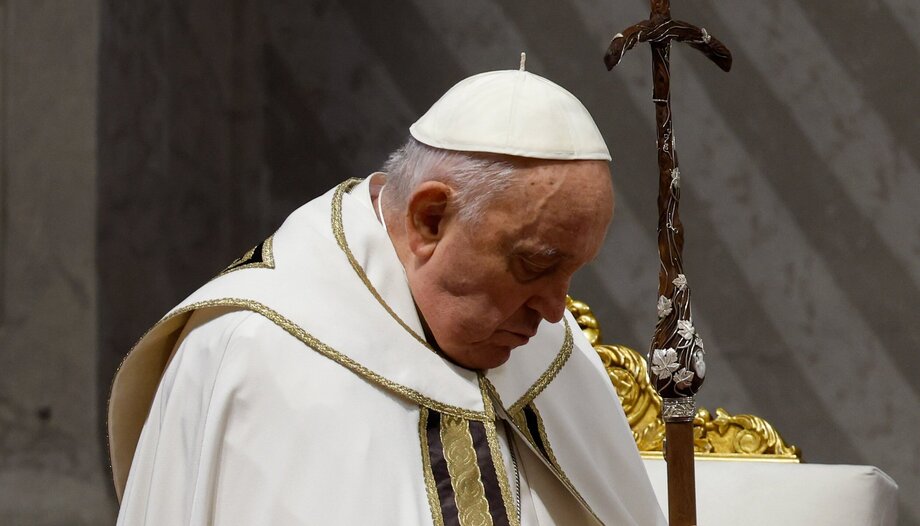In its homily of the Chrism Mass of this Maundy ThursdayPope Francis looks at St. Peter, "the first shepherd of our Church. The Pontiff traces aloud the path from Simon Peter to Jesus in order to deepen "compunction". At the beginning, he says, St. Peter "expected a political and powerful Messiah, strong and resolute, and faced with the scandal of a weak Jesus, arrested without resistance, he declared: 'I do not know him'".
However, after denying Christ three times, Francis explains that St. Peter came to know Jesus when "he allowed himself to be pierced without reserve by his gaze". At that moment, "from 'I do not know him' he will say: 'Lord, you know everything'".
The Holy Father stresses here, addressing priests, that healing of the heart is possible "when, wounded and repentant, we allow ourselves to be forgiven by Jesus; these healings happen through tears, bitter weeping and pain that allow us to rediscover love". In short, through compunction.
Compunction, true repentance
This is a term, says the Pope, that "evokes pricking. Compunction is 'a puncture in the heart,' a prick that wounds it, causing tears of repentance to flow." But it is not "a feeling that knocks us to the ground," Francis warns. Compunction is "a beneficial sting that burns inside and heals".
The Pontiff also explains that compunction is not "feeling sorry for oneself", for this is "sadness according to the world". Compunction, Francis stresses, "is to repent seriously of having saddened God with sin; it is to acknowledge always being in debt and never being creditors; it is to admit having lost the path of holiness, not having believed in the love of the One who gave his life for me."
Understood in this way, compunction allows us to "fix our gaze on the Crucified One and allow ourselves to be moved by his love that always forgives and lifts up, that never disappoints the hopes of those who trust in him. And the Pope insists that this repentance "relieves the soul of its burdens, because it acts on the wound of sin, preparing it to receive precisely there the caress of the heavenly physician".
Encounter with Christ and with the other
Therefore, Francis assures us that compunction is the antidote to hardness of heart. "It is the remedy, because it shows us the truth of ourselves, so that the depth of our being sinners reveals the infinitely greater reality of our being forgiven." And the Pope insists that "each of our interior rebirths always springs from the encounter between our misery and the Lord's mercy."
The Holy Father also speaks of solidarity, "another characteristic of compunction". Thanks to this feeling in our heart, instead of judging others, "we weep for their sins." "And the Lord seeks, especially among those consecrated to Him, those who weep for the sins of the Church and of the world, making themselves instruments of intercession for all."
Francis repeats this idea once again, assuring that "the Lord does not ask us to pass contemptuous judgments on those who do not believe, but to love and weep for those who are far away". Therefore, "let us adore, intercede and weep for others. Let us allow the Lord to work wonders. Let us not be afraid, He will surprise us".
Compunction as God's grace
The Pope warns that "in a secularized society, we run the risk of being very active and at the same time feeling impotent". We end up "losing enthusiasm", we "close ourselves up in complaint" and we make "the magnitude of the problems prevail over the immensity of God". However, the Bishop of Rome encourages us not to lose hope because "the Lord will not fail to visit us and raise us up again".
In conclusion, Francis points out that "compunction is not the fruit of our labor, but is a grace and as such is to be asked for in prayer". And the Pope offers two pieces of advice in this regard. "The first is not to look at life and the call in a perspective of efficacy and immediacy," but to look "at the whole of the past and the future." "Of the past, remembering God's fidelity", and "of the future, thinking of the eternal destiny to which we are called".
The Pontiff's second piece of advice "is to rediscover the need to dedicate ourselves to a prayer that is not compromised and functional, but gratuitous, serene and prolonged". In concluding his homily, the Pope encourages us to "feel the greatness of God in our lowliness as sinners, to look within ourselves and allow ourselves to be pierced by his gaze," as did St. Peter.





 Romain de ChateauvieuxMercy changes the world".
Romain de ChateauvieuxMercy changes the world".





